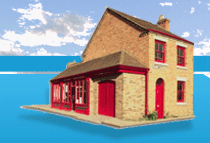|
|
 |
|
Information Related to the Text |
Writing Skill |
Warm-up Activity |
Text |
|
Covered Wagon Days

As you know , an ox is a slow animal and when traveling day after day can only go 12 or 15 miles a day. That is
why it took seven weeks to make a trip of around 300 miles. The riding was not very rough, as we traveled so slowly ,
although the road in some places was only a trail with deep ruts made by other wagons when the ground was wet.
The first day we went only as far as Vermillion . The second day we got to Yankton, where we were to meet a large
ox train from Sioux City . The train, which was loaded with freight for the Black Hills , was delayed. It was not
safe for one wagon to go alone, so we joined another train of ten wagons , which was leaving at once . In the party
were ten men,three women, and two children. All the men had guns for protection, in case we should be attacked by
the Indians.
After we left the settlements above Yankton we saw no more houses, with one exception, until we came to Fort Thompson,
an Indian agency. This exception was a lonely sod house on the bare prairie that was occupied by a young man and his wife. We asked to go in and get warm at noon, for we made very short stops at that time, sometimes none at all, but we camped earlier at night. They were pleased to see us and treated us royally. They said they did not expect to see any more people until spring, as all their neighbors had gone away for the winter.They burned hay, which they twisted into hard rolls with their hands. They seemed to have little to eat but bread and some small potatoes they had raised and then placed in a hole in the dirt floor under the bed to keep them from freezing. The woman was so hungry for sugar that my mother gave her all she could spare from our supply. Their house was not as warm as our tent.
From Fort Thompson on, there were no more settlements until we reached a post office and stored called Firesteel, which no longer exists, although the old store building still stands. We then traveled through an uninhabited country until we came to Pierre on the Missouri River. There were no settlements of white people from there to the Black Hills.
After we crossed the Missouri River we were on Indian land, but we did not see an Indian from there to Rapid City, a distance of nearly two hundred miles. They had been very hostile throughout the summer but had now gone back to their agencies for the winter. That is the reason we were traveling in cold weather . Along the road we saw several new graves of men who had been killed the previous summer.
We were now in a wild game country, but did not stop to hunt, although we saw bands of antelope. The lively little prairie
dogs would sit up on the dirt mounds around their holes , jerk their little tails, and bark at us as we passed. My sister
and I tried to catch some, but they always ducked into their holes just as we got there.
Our first sight of the Black Hills was from Grindstone Butte, a high point about seventy-five miles from them. They were just a dim, dark blue outline against the sky. The color is due to the heavy pine trees on their surface. They looked beautiful, and I was not disappointed when we got closer and I could see what they looked like. Our last camp before reaching Rapid City was at a spring called Wasta, an Indian word meaning ¡°good.¡± That night there was a blizzard, the worst storm of the trip. The cattle got away, the tent blew down on us, and I was awakened by the snow blowing in my face.
With the help of the night herder my father got the tent up, and we went to sleep again. The next day we reached Rapid
City after dark. A man came to the creek with a lantern to show us across. My father¡¯s friends had a warm supper of hot
baking-power biscuits, venison steak with gravy, and coffee ready for us. And was it good!
At first we lived in log houses with dirt floors and roofs made of poles, hay and dirt .The roofs were fine unless it rained for several days until they were wet through, and then they did leak.
In the early days the land was claimed by what was called a squatter¡¯s right, ¡°by marking it out with stakes
at the corners, building a cabin, and living on it . It was the same with gold claims, except that one had to do a
certain amount of mining work each year instead of living on them.
This is the story of my coming to the beautiful Black Hills, where I have since lived and hope to live for the rest of my life. There were hardships and dangers, but something new and interesting occurred every day, and I enjoyed every minute of the trip.
Most sincerely
orpha leGro Haxby
From Language and Life in the U.S.A.,Volume11, ed.
Gladys G. Doty, 1960.
Approximately 1,780 words.
|
|
|
 |








